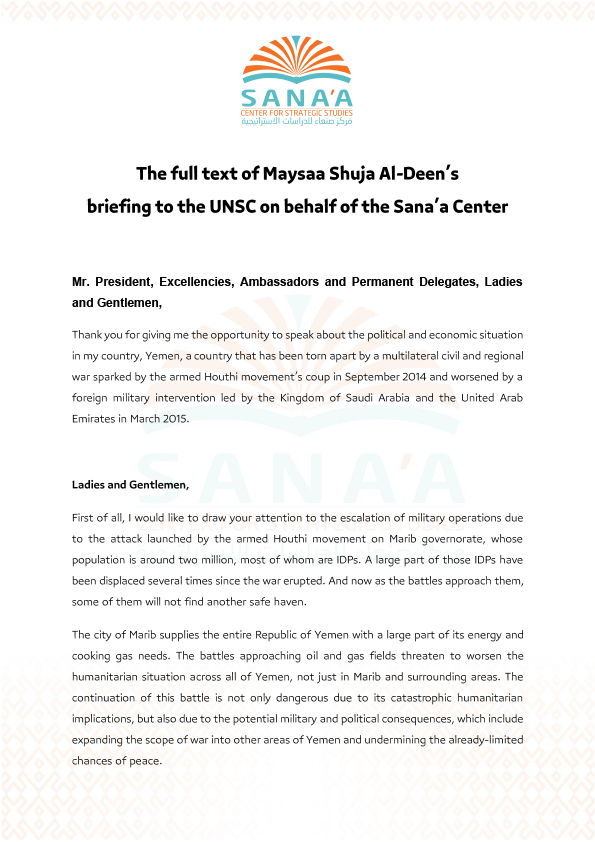PRESS RELEASE – Thursday, October 14, 2021
New York – The Sana’a Center for Strategic Studies briefed the UN Security Council today on the need for immediate international pressure to end the fighting in Marib and to prioritize economic de-escalation to mitigate suffering in Yemen.
Non-resident Fellow Maysaa Shuja Al-Deen, who addressed a public session of the Council focused on the situation in Yemen, highlighted the impact that the armed Houthi movement’s advance on Marib will have on the governorate’s 2 million residents, many of whom have been displaced several times since the war erupted.
“The continuation of this battle is not only dangerous due to its catastrophic humanitarian implications, but also due to the potential military and political consequences, which include expanding the scope of war into other areas of Yemen and undermining the already limited chances of peace,” Shuja Al-Deen said.
She also called for international support in promoting sustainable economic solutions inside Yemen and to ensure Saudi Arabia and other Gulf countries avoid placing restrictions on or harassing Yemeni expatriate workers, whose remittances are crucial to millions of Yemenis back home.
“All Gulf countries have engaged in Yemen’s war either directly or indirectly,” Shuja Al-Deen told the Security Council. “This doubles the moral and political responsibility they have toward their neighbor, Yemen, when it is bearing the consequences of war. These countries must at least open their doors for Yemeni workers, especially since they still greatly rely on millions of foreign laborers.”
Recommendations presented to the Council to halt deterioration of the humanitarian and economic situation in Yemen included to:
- Adopt in a resolution economic de-escalation in Yemen as a priority and assign the UN envoy to resume economic negotiations immediately in order to unify the Central Bank of Yemen;
- exclude Yemenis from Saudization policies and correct the employment status of irregular Yemeni workers;
- open all land, sea and air ports in Yemen, including Sana’a Airport, immediately, and lift restrictions on the entry of essential goods;
- Encourage Saudi Arabia, in partnership with the UAE, to design and execute a strategy to rebuild areas under the control of Yemeni forces loyal to them and plan vital projects in different fields, particularly the energy sector; and
- obligate the Yemeni government to pay all civil service salaries in Yemen, including in Houthi-controlled areas and to reform the structure and leadership of the Central Bank of Yemen as well as revenue-generating governmental institutions.
The full text of Shuja Al-Deen’s briefing to the UNSC on behalf of the Sana’a Center is as follows:
Mr. President, Excellencies, Ambassadors and Permanent Delegates, Ladies and Gentlemen,
Thank you for giving me the opportunity to speak about the political and economic situation in my country, Yemen, a country that has been torn apart by a multilateral civil and regional war sparked by the armed Houthi movement’s coup in September 2014 and worsened by a foreign military intervention led by the Kingdom of Saudi Arabia and the United Arab Emirates in March 2015.
Ladies and Gentlemen,
First of all, I would like to draw your attention to the escalation of military operations due to the attack launched by the armed Houthi movement on Marib governorate, whose population is around two million, most of whom are IDPs. A large part of those IDPs have been displaced several times since the war erupted. And now as the battles approach them, some of them will not find another safe haven.
The city of Marib supplies the entire Republic of Yemen with a large part of its energy and cooking gas needs. The battles approaching oil and gas fields threaten to worsen the humanitarian situation across all of Yemen, not just in Marib and surrounding areas. The continuation of this battle is not only dangerous due to its catastrophic humanitarian implications, but also due to the potential military and political consequences, which include expanding the scope of war into other areas of Yemen and undermining the already-limited chances of peace.
All this calls for immediate attention from the international community and requires its pressure to stop this fighting.
Mr. President,
Since the war erupted in Yemen seven years ago, it has become common to describe what is happening in Yemen as the world’s worst humanitarian crisis. As the war continues, humanitarian suffering increases due to the collapse of the monetary system and the deterioration of the economy. Therefore, allow me to focus on the humanitarian and economic situation since there is plenty that can be done to mitigate the suffering in Yemen.
Mr. President, Yemen is not only one of the world’s worst humanitarian crises; it has also witnessed one of the worst international responses. Our most recent research at the Sana’a Center indicates there have been massive flaws in the relief operation. A large part of Yemen’s population lives in areas controlled by the armed Houthi movement, which systematically seizes aid and uses it for its own purposes. Meanwhile, there are other flaws in areas under the control of the internationally recognized government, such as the weakness of governmental institutions, bureaucratic obstructions and complications imposed by the various militias on the ground, hindering the travel of relief workers and overall access.
This all synchronizes with international relief organizations’ failure to exert transparent efforts to guarantee that a minimum level of aid is delivered to Yemenis in need. This is in addition to the obstructions resulting from the UN’s own rules and mechanisms.
Therefore, the relief process in Yemen needs re-evaluation and requires urgent accountability to decrease squander and the misuse of funds allocated for humanitarian aid. In general, we also need a developmental approach to help create job opportunities that decrease the high rate of unemployment, which is a driver of the current conflict.
Ladies and Gentlemen,
Months ago, Saudi authorities made a decision to lay off Yemeni employees in its southern areas without clear or convincing justifications for this mass targeting of Yemenis.
Saudi Arabia partially backed down on this decision, but unfortunately, it’s part of a series of Saudi policies that have been adopted over the past years against Yemeni workers. We must note here that amid the current war, Yemeni expatriates have become the main, and almost the only, source of hard currency coming into Yemen after almost the complete suspension of oil and gas exports. Most of these expatriates are in Gulf countries, particularly Saudi Arabia where more than one million Yemenis work.
The decline in the number of Yemeni residents in Saudi Arabia and the harassment of Yemenis who have economic activities in the Kingdom have negatively impacted the situation of millions of Yemenis inside Yemen; this has exacerbated the current humanitarian crisis in the country.
All Gulf countries have engaged in Yemen’s war either directly or indirectly. This doubles the moral and political responsibility they have toward their neighbor, Yemen, when it is bearing the consequences of war. These countries must at least open their doors for Yemeni workers, especially since they still greatly rely on millions of foreign laborers.
Mr. President, Ladies and Gentlemen,
The long duration of the war resulted in a war economy that has created a huge network of war profiteers. Ignoring this aspect of the conflict has resulted in the further deterioration of the economic situation and Yemeni livelihoods. It’s important to note here that the last round of economic negotiations held by the UN Special Envoy’s office for Yemen was in May 2019 in the Jordanian capital, Amman.
Plenty can be done to find sustainable economic solutions that meet the needs of a large number of citizens in a dignified manner. Your esteemed council can exert pressure toward taking efficient economic measures that would greatly contribute to mitigating people’s suffering in Yemen.
These are urgent matters that cannot wait until the war ends.
Allow me to propose some practical recommendations that may contribute to halting the deterioration of the humanitarian and economic situation in Yemen:
To this esteemed Council, I recommend the following:
First: Issue an international resolution that adopts economic de-escalation in Yemen as a priority and assigns the UN envoy to resume economic negotiations immediately in order to unify the Yemeni Central Bank. Impose smart sanctions on parties that obstruct, or take measures that further divide financial institutions in the country.
Second: Evaluate and establish coordination and oversight mechanisms for the relief operation and the financing of aid operations. So far, only 55% of the humanitarian response plan for 2021 is funded. International organizations must also be obliged to adhere to the outcomes of the Humanitarian Summit regarding the localization of humanitarian aid.
Third: Decrease the restrictions that have resulted in the financial isolation of Yemeni banks from the global financial system in order to facilitate the import of essential goods and end informal financial transactions.
Four: Adopt a comprehensive approach to support the fragile healthcare system in Yemen and guarantee the delivery of Covid-19 vaccines to the entire country. It’s worth noting that only 1% of Yemen’s population has been vaccinated. This is shameful and reflects the international community’s weak commitment toward Yemen.
Five: Stop supporting the parties involved in Yemen’s war with weapons and reactivate the international framework for accountability and oversight, especially following the recent and unfortunate decision by the UN’s Human Rights Council not to renew the mandate of the group of eminent experts on Yemen.
This Council must also pressure Saudi Arabia and its allies via its resolutions and tools as follows:
- First: Immediately stop expelling and restraining Yemeni labor in the Gulf labor market, particularly in Saudi Arabia. Exclude Yemenis from Saudization policies, double residency fines and fines to correct the employment status of irregular Yemeni workers, while also taking into consideration the historical agreements between the two countries. This must be carried out within a comprehensive framework of preferential policies toward Yemeni workers in Saudi Arabia and other Gulf countries.
Second: Open all land, sea and air ports in Yemen, including Sana’a Airport, immediately and lift the restrictions imposed on the entry and exit of essential goods.
Third: Design and execute a strategy in partnership with the UAE to rebuild areas under the control of Yemeni forces loyal to them and plan vital projects in different fields, particularly the energy sector. Make a deposit in the Central Bank to help stabilize the Yemeni currency.
The Council’s international efforts must also obligate the Yemeni government to do the following:
First: Pay the salaries of all civil service employees in Yemen, including in Houthi-controlled areas. Ever since the Central Bank was relocated to Aden in 2016, the government has not kept its promise that public sector employees will regularly receive their wages.
Second: Carry out real reforms in the structure and leadership of the Central Bank and revenue-generating governmental institutions. Take measures that enhance transparency and accountability to limit the massive corruption in this government’s structure.
This Council must also impose the necessary measures on the Houthi movement, particularly through its allies in Tehran and friends in Muscat, by:
First: Immediately halt the Houthis’ military operations in Marib and end the siege of cities and residential areas in Taiz, Marib and Al-Bayda.
Second: End obstructions to humanitarian and relief work, particularly work that pertains to the Covid-19 pandemic. Accept vaccines provided by COVAX and fairly distribute them to all Yemenis.
Third: Immediately dissolve war economy institutions established by the Houthi movement, like the Supreme Council for the Administration & Coordination of Humanitarian Assistance (SCAMCHA), the Zakat Authority and others.
Ladies and Gentlemen,
Thank you again for inviting me and giving me the opportunity to speak before you today. I will be glad to meet with representatives of countries in the Council during the upcoming days to discuss the political and military developments, as well as the particular vision I have worked on, which pertains to establishing a presidential council as a first step toward a political solution in Yemen.

 اقرأ المحتوى باللغة العربية
اقرأ المحتوى باللغة العربية
